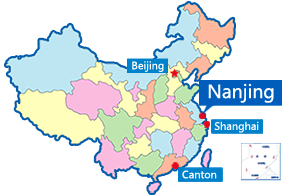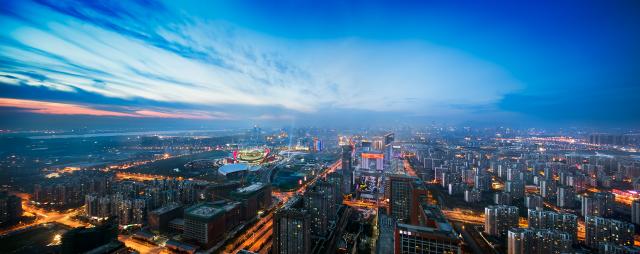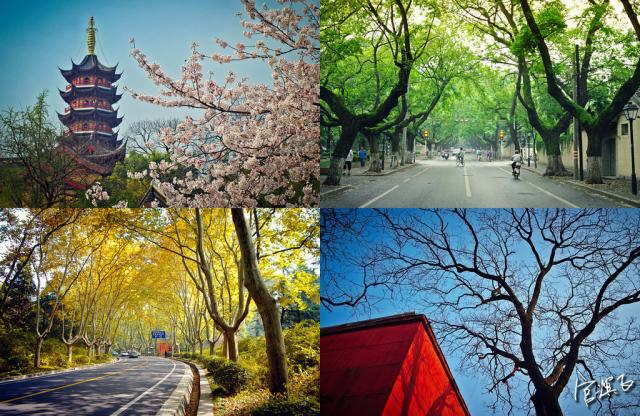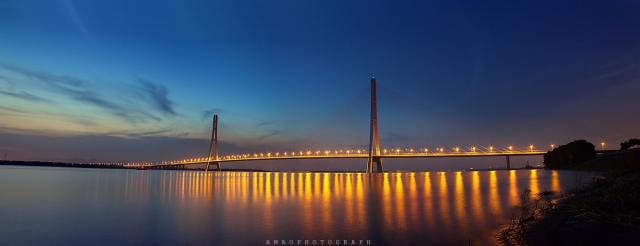 Nanjing is a city full of vigor and opportunities. It is a window for you to get a glimpse of real China. Studying and living here, you may find it changing and growing every day, you may find it a city with Chinese tradition as the background and full of many modern qualities, and you may feel the hospitality of the people here.
Nanjing is a city full of vigor and opportunities. It is a window for you to get a glimpse of real China. Studying and living here, you may find it changing and growing every day, you may find it a city with Chinese tradition as the background and full of many modern qualities, and you may feel the hospitality of the people here.
Nanjing is situated in the lower reaches of the Yangtze River, at 32°03’N and 118°47’E. It borders with the Yangtze River Delta to the east and the hilly areas of South Anhui to the west, adjacent to the water network of Taihu Lake in the south and the Jianghuai Plain in the north. With the "golden waterway" Yangtze River flowing through the city, it is 380km from the Yangtze River’s estuary to the sea, and about 300km to Shanghai, the largest city of China.
Nanjing is in the monsoon climate area of north subtropical zone, with clearly-divided four seasons. Its annual average temperature is 16℃, and the annual average precipitation 1034 mm.

Nanjing is the capital of Jiangsu Province with the total area of 6598 square kilometers, including 4728 square kilometers as urban area, and its total population is 6.4 million.
Nanjing, an ancient capital of China, enjoys a worldwide reputation for its history and culture. Archaeological findings show that human ancestors lived in Nanjing area around 300,000 years ago, and primitive villages took shape 6000 years ago. These inhabitants were the original local people. From then on, people lived and multiplied in this area generation after generation. Nanjing was made as capital in ten dynasties in history, known as one of the four major ancient capitals in China together with Beijing, Xi’an and Luoyang.

Qinhuai River
Nanjingis a city full of historic sites and natural beauties. In Spring you may celebrate the Plum Blossom Festival in Ming Xialing Mausoleum, which was built in Ming Dynasty, about 500 years ago, or have an outing in Niushou Mountain. In Summer you may taste local grapes as well as Chinese rural scenery in Jiangxin Island or walk around Xuanwu Lake. In Autumn, you may enjoy the specially beautiful autumn in Purple Mountain. In Winter, the rings from the Qixia Temple will welcome the new year.

Four Seasons of Nanjing
Nanjing is a city where you can live conveniently and happily. Super-markets, including Wal-Mart, Carrifour and local Suguo, which spread all around the city, can provide you with all the necessities of your life. Department stores, located in the downtown area, will make you close to the world-famous brands, including Chanel, Gucci and Dupont, just as you are in any modern city of the world. Various restaurants, some of which serve traditional Chinese food of all flavors, some serve foreign food, including western food, Indian food, Lebanese food and Thai food, may cater for you from different countries and regions. If you’d like to spend your evening in pubs, you may find the ones attached to large hotels. Near the downtown area, there is a pub zone called 1912 with traditional Chinese buildings, where you can enjoy yourself to your heart’s content. Transportation by bus, train and plane can take you to nearly every city of China. A short trip by air may lead you to other big cities of China, such as Beijing and Guangzhou. It only takes you about three hours from Nanjing to Shanghai by train or bus. Within the city you may choose to travel by bus, taxi, subway or bicycle.

Nanjing Yangzte River Bridge
Nanjingis one of the highly-developed cities in China. The average annual disposable income of Nanjing urban residents is about 15,000 RMB. Nanjing is one of the important industrial bases in East China with strong industrial economic strength, accounting for about 1% of the country total in terms of gross industrial capability. Many foreign multi-national corporations have regarded Naning as a good place to establish their foreign branches.